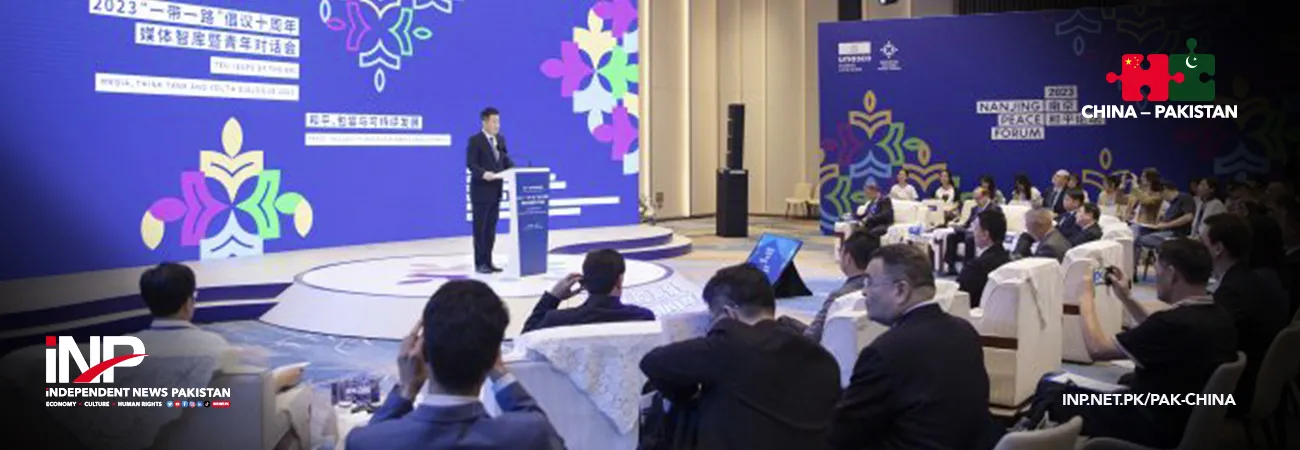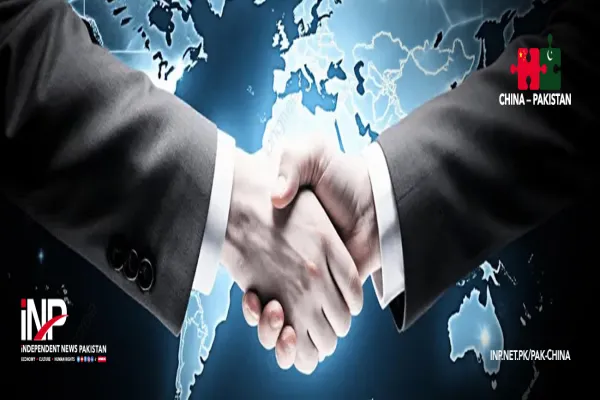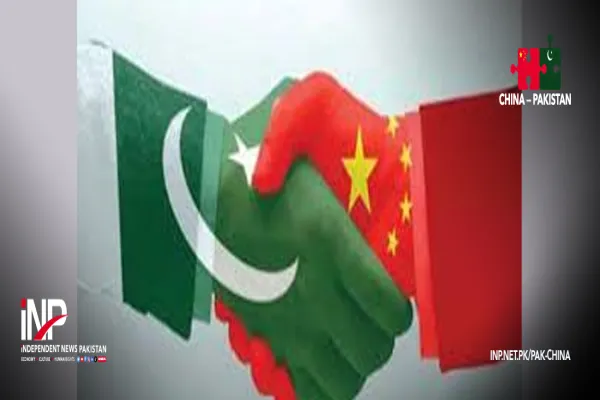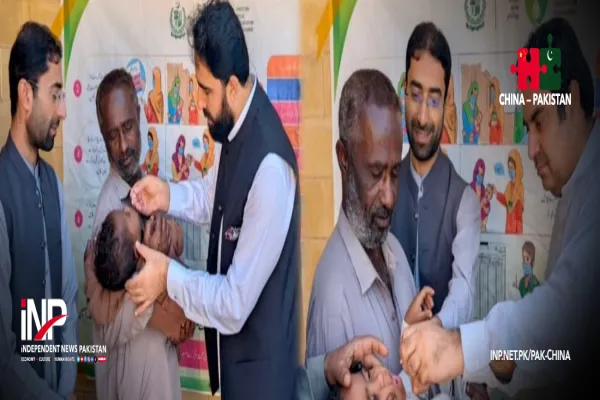i NEWS PAK-CHINA
Ten Years of the BRI: Media, Think Tank and Youth Dialogue 2023 held in Nanjing, according to a message received here on Friday. The event was hosted by China International Communications Group (CICG) and the Organizing Committee of Nanjing Peace Forum, and organized by the CICG Center for Europe and Asia (China Pictorial Publications) and the Information Office of Nanjing Municipal People’s Government. Under the theme “Peace, Inclusivity, and Sustainable Development,” the dialogue aimed to promote mutual exchange among media, think tanks, and youth from BRI countries, offer suggestions for the high-quality BRI development, and explore new approaches, paths, and areas of cooperation within the BRI framework.
Yu Tao, vice president of CICG, Peng Zhengang, executive vice minister of the Publicity Department of the CPC Nanjing Municipal Committee, Qiao Wei, chairman of the Overseas Chinese Charity Foundation of China and former vice chairman of the All-China Federation of Returned Overseas Chinese, Wang Xiaohui, editor-in-chief of China Internet Information Center (China.org.cn), and Ou Xiaoli, former director general of the Department of Social Development of the National Development and Reform Commission, delivered speeches at the opening ceremony. In his opening speech, Yu Tao emphasized the importance of reaching consensus through equal consultation, establishing mechanisms to promote communication, and sharing responsibilities to advance cooperation.
He highlighted the need to build a platform for cultural exchange and integration among BRI countries, promoting common development through openness and connectivity. Yu also stressed the role of cultural exchange in various fields such as education, technology, culture, sports, tourism, and health, fostering the convergence of values among people from different countries. He encouraged active participation from BRI countries in contributing their wisdom to promote progress in human civilizations through mutual learning and exchange and to consolidate consensus among countries for building a better world. Qiao Wei emphasized the unique role of overseas Chinese in advancing the BRI and called for mobilizing and guiding this unique force to promote mutually beneficial cooperation between China and other countries along the Belt and Road, so as to create a bright future together.
He encouraged overseas Chinese to play the role of nongovernmental ambassadors in promoting exchanges between China and the rest of the world to introduce China and Chinese culture to the world. Qiao called for gathering the wisdom and strength of overseas Chinese to facilitate mutual understanding among people from various countries. He also called on young overseas Chinese to engage in cultural exchange and communication for building the BRI.
Makhdoom Babar, president and editor-in-chief of the Daily Mail in Pakistan, underscored the profound significance of the BRI in promoting peaceful development and enhancing security governance. Makhdoom Babar delivers a speech via video link at the forum. He emphasized that the BRI, encompassing projects such as the China-Pakistan Economic Corridor (CPEC) and the New Eurasian Land Bridge, extends beyond mere trade and infrastructure development. It embodies the core principles of peaceful coexistence and a shared future, fostering cooperation and security.
Babar urged the global community to embrace the principles of the BRI, prioritizing peaceful development over conflict, as the BRI paves the way toward a future characterized by cooperation, mutual development, and peace. In his perspective, platforms like the BRI offer opportunities for nations to collaborate on peaceful development rather than becoming embroiled in destructive conflicts. Grzegorz Kołodko, a professor of economics at Kozminski University and former Polish Deputy Prime Minister and Minister of Finance, emphasized the need to enhance the BRI by incorporating a “soft aspect” alongside existing hard infrastructure development. This soft aspect involves investing in human capital, fostering joint research and development projects, promoting collaboration among universities and research institutes, facilitating cultural exchange, and supporting translation efforts.
Kołodko believes that the BRI can contribute to globalization by bridging cultures, values, and knowledge. He stressed the importance of such cooperation in addressing global challenges and countering the negative effects of protectionism and xenophobia. Moreover, Kołodko acknowledged that international collaboration and joint efforts could make globalization more mutually beneficial, thus promoting peace and prosperity around the world. Peng Zhengang stated that during the Ming Dynasty (1368-1644), mariner Zheng He built treasure ships in Nanjing and embarked on peaceful voyages, fostering economic, trade, and cultural exchanges.
His voyages left a splendid chapter in the history of the Maritime Silk Road. Today, Nanjing continues to strengthen cultural, economic, and trade exchanges with countries and regions along the Belt and Road, promoting people-to-people connectivity. The city will further expand international cultural cooperation and exchanges, encouraging young people, especially the Generation Z, to build the bonds of the BRI even stronger. Representatives from the media and think tanks and youth delegates from BRI countries such as China, Egypt, South Korea, Cambodia, Pakistan, Kyrgyzstan, Russia, and Poland participated in the event.
Under the BRI framework, suggestions were made to enhance security cooperation, embark on a new journey of international cooperation, and achieve shared prosperity. A ceremony for releasing the High-Quality BRI Development Momentum and Situation Awareness Report was held during the event, which was presented by Li Shaoxian, director of the China Institute for Arab Studies at Ningxia University. The report was a collaborative publication by CICG’s B&R International Communication Research Institute and a research team from PKU. This event is part of the 2023 Nanjing Peace Forum. The forum was held to promote the integration of Chinese ideas, youth responsibilities, and international concerns, contributing wisdom and strength to building a community with a shared future for humanity.
Credit: Independent News Pakistan (INP) — Pak-China









